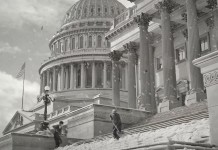By Justice Markandey Katju
By declaring the enquiry ordered by the Delhi Government to probe into the Delhi & District Cricket Association scam as illegal, Lt Governor of Delhi Najeeb Jung has raised an important constitutional and legal question.
The reasoning given by Jung is that the Delhi government cannot order enquiries as under the Commissions of Inquiry Act, 1952 only a state government can order an enquiry, and the Delhi government is not a state government.
With respect, I submit that the reasoning of Mr Jung is not tenable.
It is true that under the Commissions of Inquiry Act either the Central government or State government can order an enquiry.
Section 3 of the Act states:
“(1) The appropriate Government may, if it is of opinion that it is necessary so to do, and shall, if resolution in this behalf is passed by each House of Parliament or, as the case may be, the Legislature of the State, by notification in the Official Gazette, appoint a Commission of Inquiry for the purpose of making an inquiry into any definite matter of public importance and performing such functions and within such time as may be specified in the notification, and the Commission so appointed shall make the inquiry and perform the functions accordingly.”Section 2(a) of the Act defines “appropriate government” to mean the Central or state governments.
The question therefore is whether the Delhi government is a state government
I submit that it is, though with three limitations: the Delhi legislature cannot legislate in respect of land, police and public order, and hence the Delhi government cannot deal with these three subjects vide Article 162 of the Constitution.
Article 239AA, which was introduced by the 69th Constitutional Amendment, states :
(1) As from the date of commencement of the Constitution (Sixty-ninth Amendment) Act, 1991 the Union Territory of Delhi shall be called the National Capital Territory) and the administrator thereof appointed under article 239 shall be designated as the Lieutenant Governor.
(2) (a) There shall be a Legislative Assembly for the National Capital Territory of Delhi and the seats in such Assembly shall be filled by members chosen by direct election from territorial constituencies in the National Capital Territory.
(b) The total number of seats in the Legislative Assembly, the number of seats reserved for scheduled castes, the division of the National Capital Territory into territorial constituencies (including the basis for such division) and all other matters relating to the functioning of the Legislative Assembly shall be regulated by law made by Parliament.
(c) The provisions of articles 324 to 327 and 329 shall apply in relation to the National Capital Territory, the Legislative Assembly of the National Capital Territory and the members thereof as they apply, in relation to a State, the Legislative Assembly of a State and the members thereof respectively and any reference in articles 326 and 329 to “appropriate Legislature” shall be deemed to be a reference to Parliament.
(3) (a) Subject to the provisions of the Constitution, the Legislative Assembly shall have power to make laws for the whole or any part of the National Capital Territory with respect to any of the matters enumerated in the State of List or in the Concurrent List in so far as any such matter is applicable to Union territories except matters with respect to Entries 1,2, and 18 of the State List and Entries 44, 65 and 66 of that List in so far as they relate to the said Entries 1,2,and 18—”
Now Article 239AA clearly indicates that after enactment of Article 239AA Delhi is no longer a Union territory. No doubt, it is not called a state but the National Capital Territory, but we have to go by the substance of the matter, not mere nomenclature.
Delhi has a legislature and a Council of Ministers. Its legislature is empowered to make laws except in matters in the Union List of the Seventh Schedule to the Constitution, and those relating to land, police and public order vide Article 239AA(3)(a).
Hence I submit that Delhi is certainly a State as contemplated by the Commissions of Inquiry Act, 1952.
Rights and wrongs:
It would be strange to say that the Delhi legislature and Delhi Government, which can deal with all matters except with those in the Union List and land, police and public order, cannot order an enquiry into a matter of public importance such as the alleged DDCA scam Sports are a matter covered by entry 33 of List 2 in the Seventh Schedule to the Constitution. Hence the Delhi government can legislate on the subject, and the Delhi government can deal with it, but how can they legislate or deal with it if they cannot even enquire into it?
I submit that the word State in Section 3 of the Commissions of Inquiry Act must receive a purposive, and not literal, interpretation.
In this connection, it may be mentioned that, as pointed out by Lord Denning in Notham v. Bamet Council, (1978) 1 WLR 220. the literal interpretation is now completely out of date and has been replaced by the purposive approach referred to by Lord Diplock in Kommins Ballrooms Co. v. Zenith investments Ltd., (1971) AC 850 (881). vide Lord Denning’s The Discipline of Law. Chapter II.
10. In Workmen of American Express International Banking Corporation v. Management. AIR 1986 SC 458. the Indian Supreme Court observed:
“The principles of statutory construction are well-settled In construing legislations the imposture of literal construction must be avoided and the prodigality of its misapplication must be recognised and reduced. Judges ought to be more concerned with the ‘colour’, the ‘content’ and the ‘context’ of such statutes. We have borrowed the words from Lord Wilberforce’s opinion in Prenn v. Simmonds. 1971 (3) All ER 237. In the same opinion Lord Wilberforce pointed out that law is not to be left behind in some island of literal interpretation but is to enquire beyond the language, unisolated from the matrix of facts in which they are set ; the law is not to be interpreted purely on internal linguistic considerations. Where legislation is designed to give relief against certain kinds of mischief, the Court is not to make inroads by making etymological excursions.”
11. Similarly, in Hindustan Lever Ltd. v. Ashok Vishnu Kate. 1995 (6) SCC 326. the Supreme Court said :
“Francis Bennton in his Statutory Interpretation Second Edn.. has dealt with the Functional Construction Rule in Part XV of his book. The nature of purposive construction is dealt with in Part XX at page 659 thus :
“A purposive construction of an enactment is one which gives effect to the legislative purpose by :
(a) following the literal meaning of the enactment where that meaning is in accordance with the legislative purpose (in this Code called a purposive-and-literal construction), or,
(b) applying a strained meaning where the literal meaning is not in accordance with the legislative purpose (in the Code called a purposive-and-strained construction).”
At p. 661 of the same book, the author has considered the topic of “Purposive Construction” in contrast with literal construction. The learned author has observed as under :
“Contrast with literal construction–Although the term ‘purposive construction’ is not new, its entry into fashion betokens a swing by the appellate courts away from literal construction. Lord Diplock said in 1975 : ‘If one looks back to the actual decisions of the [House of Lords) on questions of statutory construction over the last 30 years one cannot fail to be struck by the evidence of a trend away from the purely literal towards the purposive construction of statutory provisions’. The matter was summed up by Lord Diplock in this way :
…I am not reluctant to adopt a purposive construction where to apply the literal meaning of the legislative language used would lead to results which would clearly defeat the purposes of the Act. But in doing so the task on which a Court of justice is engaged remains one of construction, even where this involves reading into the Act words which are not expressly included in it.”
The above decisions thus clearly show that in England as well as in our country also, now the purposive approach is being preferred to the literal approach in statutory construction.
Accordingly, I submit, the reasoning of Mr Najeeb Jung is untenable
(Views expressed in this article are of the author. 24live.in does not hold responsibility for the context and correctness of the content in any manner.)






























